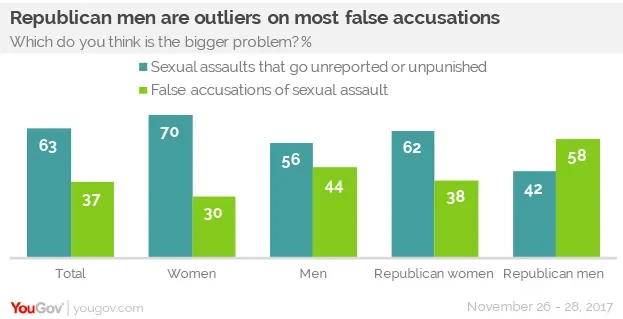Americans think harassment is a problem in many industries
As sexual harassment allegations pile up in Congress and the media, Americans are in no mood for forgiveness. For women especially, the seriousness of sexual harassment in Congress, in the military, in colleges and elsewhere is clear – and nearly half of women in the latest Economist/YouGov Poll call sexual harassment a serious problem in the places where they have themselves worked.
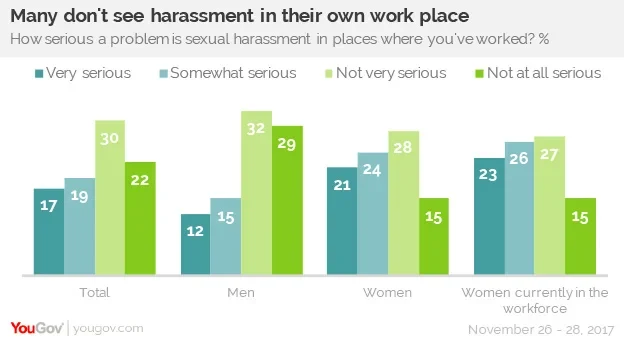
Nearly half (49%) of women currently in the workforce (employed full-time or part time, or currently unemployed but looking for a job) describe the situation as serious, and more than half of working women under the age of 45 agree. More than half of all women have had personal experience with harassment.
Media focus in the last week has been on sexual misconduct in the media and in politics. While Hollywood is most likely to be seen as a place where sexual harassment is a very serious problem, Americans see the problem as serious in the country overall, in the media, in colleges, in the military and in Congress, too. In each case, women are more likely than men to see sexual harassment as
veryserious.
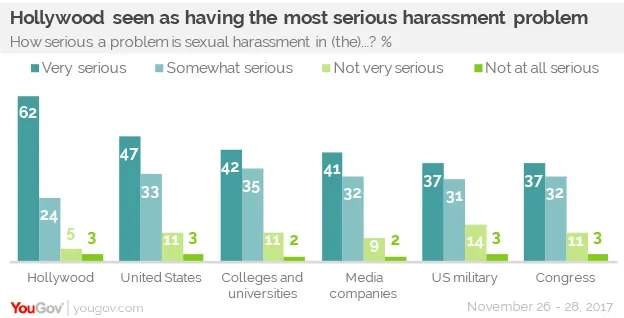
There is little sympathy for Charlie Rose, one of the latest media celebrities to be punished because of sexual misconduct allegations. (This poll was conducted before Today Show host Matt Lauer was fired following allegations of sexual misconduct.) Americans believe the charges against Rose by more than ten to one. Six in ten think the punishments by CBS and PBS – CBS firing him and PBS discontinuing his program -- were appropriate. Only 10% think they were excessive. But far fewer (11%) said Rose ‘s punishments were not harsh enough than felt that way
about Harvey Weinstein’s punishments in the Economist/YouGov Poll two weeks ago.
There also is not a lot of sympathy for Senator Al Franken or Congressman John Conyers. Conyers, who settled a claim of harassment two years ago, is seen negatively by three times as many adults as view him favorably. Conyers, a Democrat and the longest serving African-American in Congress, also gets negative ratings from Democrats and from black Americans. More importantly, half of the total public, half of Democrats, and half of African-Americans think Conyers should resign.
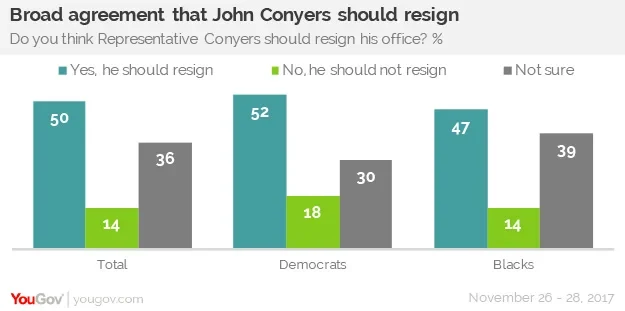
[Last week, before these charges against Representative Conyers became public, two-thirds of the public said in the Economist/YouGov Poll that if a member of Congress engages in sexual misconduct while in office that Congressperson should be removed from office.]
Senator Franken fares only a little better. As they did last week, Americans overall think he should resign, and by a margin of 39% to 27%. However, Democrats narrowly believe he should not resign, 39% to 32%.
Democratic opinion of Franken is mirrored by Republican opinion towards Alabama Senate GOP candidate Roy Moore. By 50% to 21%, Americans think Moore should leave the Senate race. However, Republicans disagree, 38% to 28%.
Harassment is not a Democratic or a Republican problem. Just about the same percentage say the Democratic Party is worse on the issue as believe the Republican Party is, but even more believe both are parties equally bad.
Democrats are more likely than Republicans to think sexual harassment of Congressional staffers is relatively common.
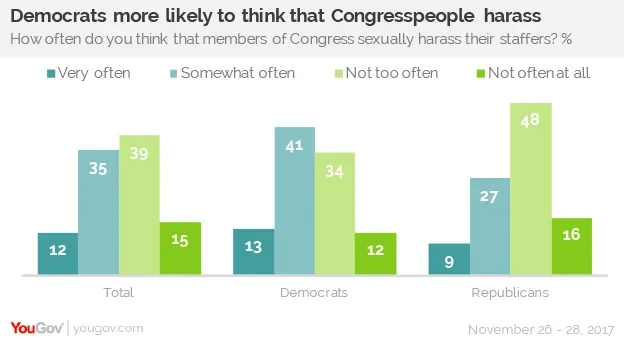
There is little difference between men and women overall on this question.
Even though many think abuse is common in Congress, most don’t think the problem afflicts their own Representative. While not a ringing endorsement, just one in five say it is even somewhat likely that their own Representative has engaged in sexual misconduct while in Congress.
About eight in ten Representatives are male; but only 55% in this polls said they knew their Representative was male. A third admitted they didn’t know. Many who know they are represented by a man aren’t sure whether or not he may have engaged in sexual harassment while in Congress. Most who know they are represented by a women don’t believe it is likely that she has engaged in sexual misconduct in office.
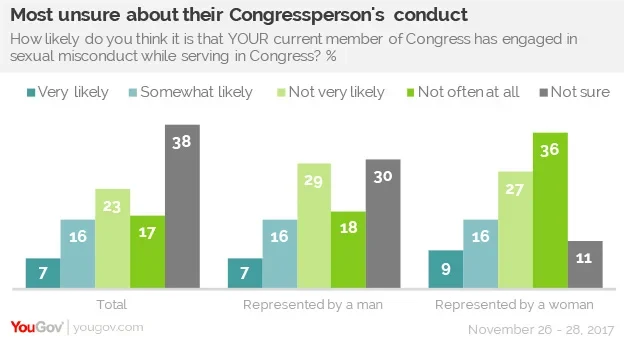
The answers about respondents’ Senators are similar.
Recent charges against these prominent men have certainly affected how people view themselves. 16% of men admit they have done things, sometimes inadvertently, that a woman might have considered to be an unwanted sexual advance. Even more, 23%, say they have stopped doing or saying certain things because a woman might consider them to be harassment. Men 65 and older are the most likely to admit they have said or done things that could be misconstrued; there is much less of an age difference on whether men have changed anything.
However, men are more likely than women to think that false accusations are a bigger problem than unreported or unpunished harassment. The gender gap on this question is especially large among Republicans.
